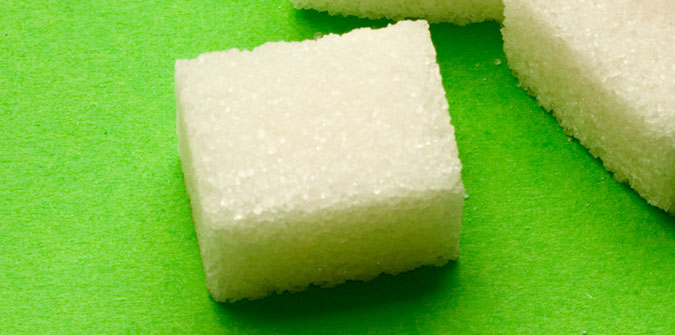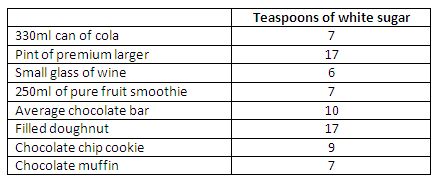Healthy Food & Drink Substitutes - Part 1
Sugar substitutes and low calorie drinks
Sugar rich food and drink is linked with the obesity epidemic that has swept the western world creating bulging waistlines in its path. The ever-so-clever marketing of sugary produce has meant that it’s no longer the norm to save our sugared favourites for rare treats. Many of us think nothing of enjoying a daily sugar rush from drinks, confectionary, cakes and pastries. However recent reports indicate that diet drinks can actually trigger weight gain!
Are there healthier alternatives available? Are there any drawbacks associated with choosing a lower calorie alternative? Let’s take a closer look at sugar and the available alternatives, in an attempt to get a better understanding:
Sugar
A teaspoon of refined sugar equates to around 20 calories. The table below shows the startling equivalent number of teaspoons within some of our favourite food and drinks:
Are there healthier alternatives available? Are there any drawbacks associated with choosing a lower calorie alternative? Let’s take a closer look at sugar and the available alternatives, in an attempt to get a better understanding:
Sugar
A teaspoon of refined sugar equates to around 20 calories. The table below shows the startling equivalent number of teaspoons within some of our favourite food and drinks:
Sugar substitutes
Substitutes are split between natural sweeteners that are usually plant derived, and artificial sweeteners. The main sugar substitutes you’re likely to find in today’s produce include saccharin, aspartame, stevia, neotame, sucralose, cyclamate, sorbitol, xylitol and acesulfame potassium.
All these substitutes are either sweeter than or as sweet as sugar while offering the benefit of having little to no calorific value. Sugar substitutes are therefore favoured by product manufacturers as they are generally a cheaper alternative to sugar and because of their potency require less product to produce the same sweetness.
Artificial Sweeteners
Saccharin
At 300 – 500 times sweeter than sugar, saccharin is known for its bitter aftertaste, but is often mixed with other sweeteners to produce a more natural tasting sweetness.
Aspartame
At 200 times sweeter than sugar, aspartame is used as a tabletop artificial sweetener, however it is not suitable for home baking as it breaks down at high temperatures. Like saccharin it has a bitter aftertaste and requires blending with other sweeteners.
Sucralose
At 600 times sweeter than sugar this artificial sweetener packs a powerful punch. It’s stable at high temperature so can be used in home baking and frying. Sucralose becomes a great recommendation for anyone interested in lowering the calorie content of home cooking. Its brand name is Splenda.
Neotame
Made by Nutrasweet, Neotame is 8000 time sweeter than sugar so a little goes a very long way, making this additive very attractive to produce manufacturers.
Acesulfame potassium
200 times sweeter than sugar and stable at high temperatures to make it ideal for baking, this sweetener has a bitter aftertaste so is usually blended with other sweeteners to produce a more sugar-like taste.
Natural Sweeteners
Stevia
Derived from the stevia plant and 250 times sweeter than sugar, this zero calorie sugar alternative is widely used in low calorie drinks
Xylitol
Xylitol is a sugar alcohol, with similar sweetness to sugar, no bitter aftertaste and has been proven to be beneficial in dental health. Therefore it’s most common use is within toothpaste, chewing gum and mouthwash.
Summary
The benefits for those following a calorie controlled diet stack up favourably. Sugar substitutes are cleverly blended to produce great tasting alternatives to sugar. If you have a sweet tooth and struggle with your weight, sugar substitutes are definitely worth a try.
However, a word of caution! Recent reports have linked excessive use of low calorie drinks with weight gain. The drinks are said to increase a person’s sweet tooth making them crave more sugar.
Surely the answer here is to moderate the use of low calorie drinks in your diet and take a sensible approach to artificial sweeteners.
Too much of any good thing is generally bad for you, isn’t it?
Substitutes are split between natural sweeteners that are usually plant derived, and artificial sweeteners. The main sugar substitutes you’re likely to find in today’s produce include saccharin, aspartame, stevia, neotame, sucralose, cyclamate, sorbitol, xylitol and acesulfame potassium.
All these substitutes are either sweeter than or as sweet as sugar while offering the benefit of having little to no calorific value. Sugar substitutes are therefore favoured by product manufacturers as they are generally a cheaper alternative to sugar and because of their potency require less product to produce the same sweetness.
Artificial Sweeteners
Saccharin
At 300 – 500 times sweeter than sugar, saccharin is known for its bitter aftertaste, but is often mixed with other sweeteners to produce a more natural tasting sweetness.
Aspartame
At 200 times sweeter than sugar, aspartame is used as a tabletop artificial sweetener, however it is not suitable for home baking as it breaks down at high temperatures. Like saccharin it has a bitter aftertaste and requires blending with other sweeteners.
Sucralose
At 600 times sweeter than sugar this artificial sweetener packs a powerful punch. It’s stable at high temperature so can be used in home baking and frying. Sucralose becomes a great recommendation for anyone interested in lowering the calorie content of home cooking. Its brand name is Splenda.
Neotame
Made by Nutrasweet, Neotame is 8000 time sweeter than sugar so a little goes a very long way, making this additive very attractive to produce manufacturers.
Acesulfame potassium
200 times sweeter than sugar and stable at high temperatures to make it ideal for baking, this sweetener has a bitter aftertaste so is usually blended with other sweeteners to produce a more sugar-like taste.
Natural Sweeteners
Stevia
Derived from the stevia plant and 250 times sweeter than sugar, this zero calorie sugar alternative is widely used in low calorie drinks
Xylitol
Xylitol is a sugar alcohol, with similar sweetness to sugar, no bitter aftertaste and has been proven to be beneficial in dental health. Therefore it’s most common use is within toothpaste, chewing gum and mouthwash.
Summary
The benefits for those following a calorie controlled diet stack up favourably. Sugar substitutes are cleverly blended to produce great tasting alternatives to sugar. If you have a sweet tooth and struggle with your weight, sugar substitutes are definitely worth a try.
However, a word of caution! Recent reports have linked excessive use of low calorie drinks with weight gain. The drinks are said to increase a person’s sweet tooth making them crave more sugar.
Surely the answer here is to moderate the use of low calorie drinks in your diet and take a sensible approach to artificial sweeteners.
Too much of any good thing is generally bad for you, isn’t it?


